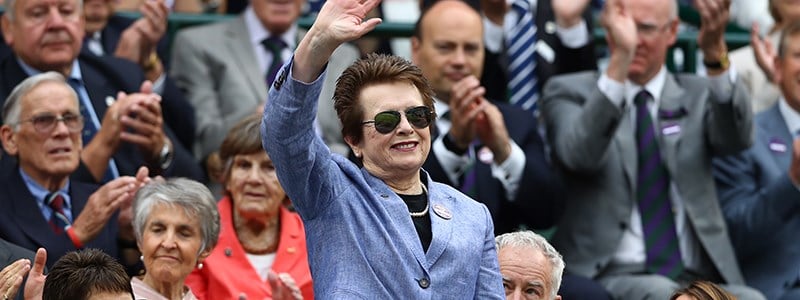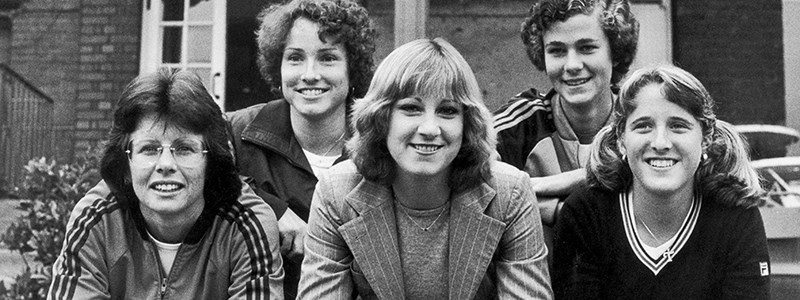
History Makers: Billie Jean King
• 6 MINUTE READ
In the first of a new series – shining a light on the ‘History Makers’ who have shaped the tennis world both on and off the court – we take an in-depth look into the life and legacy of Sports Icon and Champion of Equality, Billie Jean King.
This week, Great Britain will compete against Mexico in the play-offs for a shot at making the finals for the 2022 World Cup of tennis.
The newly-named Billie Jean King Cup celebrates one of sport’s most influential figures – not only for what she achieved on the court, but her fight for equality and growth of the women’s game.
A player, coach and pioneer for social justice, King has paved the way for millions of players and continues to inspire as a women’s rights activist.
From Long Beach to Wimbledon champion
King’s tennis journey began in California, back in 1955.
Her first love was softball, but aged 11 one of King’s classmates suggested that she might want to try tennis, to which she replied “What’s tennis?”
Sure enough after saving up her pocket money to by her first racket, she headed to a local public court in Long Beach. After a few lessons, King was hooked. It wasn’t long before she began to take the world by storm.

Throughout her illustrious career – spanning 31 years from 1959-1990 – King won 39 Grand Slam titles in singles, doubles and mixed doubles. To this day she sits joint third in most major titles won – a feat she shares with fellow American great, Serena Williams.
It was only fitting her first triumph would come on the lush grass courts of Wimbledon, a tournament King would go on to dominate.
King won 20 trophies in total at SW19, with memorable victories over fierce rivals such as British star Ann Jones, Maria Bueno, Chris Evert and Evonne Goolagong.
But, arguably one of her most impressive achievements came on her Wimbledon debut. Known back home for her aggressive style of play, but with little reputation around the world, a 17-year-old King came into the 1961 Championships as a relative unknown.
Partnering Karen Hantze, the duo became the youngest pairing in history to lift the women’s doubles title, etching their name into the record books forever.

By the end of her career it’s safe to say King had secured her place at the top table of both tennis and sporting greats.
She finished six seasons as the world’s best player, boasted a trophy cabinet that would leave even the greatest champions green with envy, and won multiple titles with the USA in the Fed Cup.
Needless to say her attacking flair and habit for winning will live long in the memory of tennis and sports fans alike.
Paving the way for the future of women’s tennis
When looking back at the careers of some of history’s greatest sportsmen and women the conversation always turns to legacy – who had the biggest impact on their sport as well as the wider world?
What’s most telling about King is despite all of her on court accolades – the trophies, the records, the epic matches – it’s her achievements behind the scenes in driving equality for the women’s game that has had a greater impact.
Back in 1970, King and eight other top players started a revolution in the pursuit of a brighter future for women’s tennis. Later referred to as the ‘Original 9’, these pioneers laid the foundations for a more expansive women’s game that offered greater opportunities for professional players.

In September that year they made the brave decision to move away from the men and signed $1 contracts to kick start a new women’s only tennis tour called the Virginia Slims Circuit. The circuit was run by publisher Gladys Heldman and began the first steps towards a unified women's tour.
This set the wheels in motion for what we know today as the Women’s Tennis Association, or the WTA for short.
King would later become the Association’s first president and with her then husband Larry King, established the World Team Tennis event – an intercity competition that championed showcasing men and women equally across the United States.
One of the most iconic moments in King’s career, of course, was her infamous match against former Grand Slam champion, Bobby Riggs, in a clash that would come to be known as ‘The Battle of the Sexes’.
A former Wimbledon winner and World No.1, Riggs argued the women’s game was so inferior to the men’s he could still defeat the top pros.
He had already played and beat Margaret Court before challenging King, with a $100,000 cheque on the line for the victor.
The match was played at the Houston Astrodome in Texas in September 1973 in front of a record 30,490 rowdy spectators and broadcast to over 90 million across the globe.

With the weight of women’s tennis on her shoulders, King pulled off one of her most significant career victories, taking the match 6–4, 6–3, 6–3.
After the match King said: “To beat a 55-year-old guy was no thrill for me. The thrill was exposing a lot of new people to tennis."
Despite all of her work to date, in a recent interview with the LTA, King made it clear her ambition and drive for greater equality across both the professional and grassroots game have never been stronger.
“We stand for inclusion and diversity and we want to be on the right side of history,” she said.
“I’m not done yet, there’s still plenty more I want to do. We want equality – we need to make it right for anyone and inclusive for all genders, cultures, etc. I want everyone to have a chance to play.”
The Billie Jean King Cup
Earlier this year, the ITF renamed the formerly known Fed Cup as the Billie Jean King Cup.
King won the competition seven times as a player, a title haul that can only be trumped by Evert’s record of eight, and would later captain the team to a further three from 1996-2002.
To have the event named after her is testament to what she has done for the game.

“It’s an honour, I still can’t quite believe it,” she said. “I keep calling it the Fed Cup still! I played in the first Federation Cup in 1963 as an 18-year-old.”
“We played at Queen’s Club and I remember playing Australia in the finals.
“We were so close in the doubles and Darlene Hard looked at me and I told her we have to win this.
“All week I had been saying it, because it’s all about history and I love history. In the end we just barely won but there was so much elation because it was such a tight match.
“It’s about playing for something bigger than yourself; it’s playing for your country.”
King’s focus still remains as strong today as when she started out 50 years ago. Her aims are simple: to push for gender equality, and to inspire more people to play tennis.





